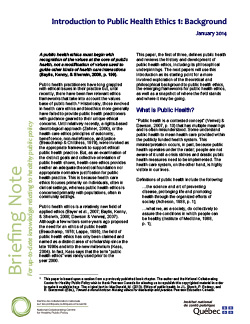Introduction to Public Health Ethics 1: Background
A public health ethics must begin with recognition of the values at the core of public health, not a modification of values used to guide other kinds of health care interactions (Baylis, Kenny, & Sherwin, 2008, p. 199).
Public health practitioners have long grappled with ethical issues in their practice but, until recently, there have been few relevant ethics frameworks that take into account the values base of public health.1 Historically, those involved in health care ethics and bioethics more generally have failed to provide public health practitioners with guidance geared to their unique ethical concerns. Until relatively recently, a rights-based deontological approach (Zahner, 2000), or the health care ethics principles of autonomy, beneficence, non-maleficence, and justice (Beauchamp & Childress, 1979), were invoked as the appropriate framework to support ethical public health practice. But, as an examination of the distinct goals and collective orientation of public health shows, health care ethics provides neither an adequate theoretical foundation nor appropriate normative justification for public health practice. This is because health care ethics focuses primarily on individuals, often in clinical settings, whereas public health ethics is concerned primarily with populations, often in community settings.
Public health ethics is a relatively new field of applied ethics (Bayer et al., 2007; Baylis, Kenny, & Sherwin, 2008; Dawson & Verweij, 2007). Although a few writers some years ago proposed the need for an ethics of public health (Beauchamp, 1976; Lappe, 1986), the field of public health ethics has only been claimed and named as a distinct area of scholarship since the late 1990s and into the new millennium (Kass, 2004). In fact, Kass says that the term “public health ethics” was rarely used prior to the year 2000.
This paper, the first of three, defines public health and reviews the history and development of public health ethics, including its philosophical underpinnings. The next papers will use this introduction as its starting point for a more involved exploration of the theoretical and philosophical background to public health ethics, the emerging frameworks for public health ethics, as well as a snapshot of where the field stands and where it may be going.
1 This paper is based upon a section from a previously published book chapter. The author and the National Collaborating Centre for Healthy Public Policy wish to thank Pearson Canada for allowing us to republish this copyrighted material in order to make it available here. The original text is: MacDonald, M. (2013). Ethics of public health. In J.L. Storch, P. Rodney, and R. Starzomski (Eds.), Toward a moral horizon: Nursing ethics for leadership and practice. Pearson Education Canada.


